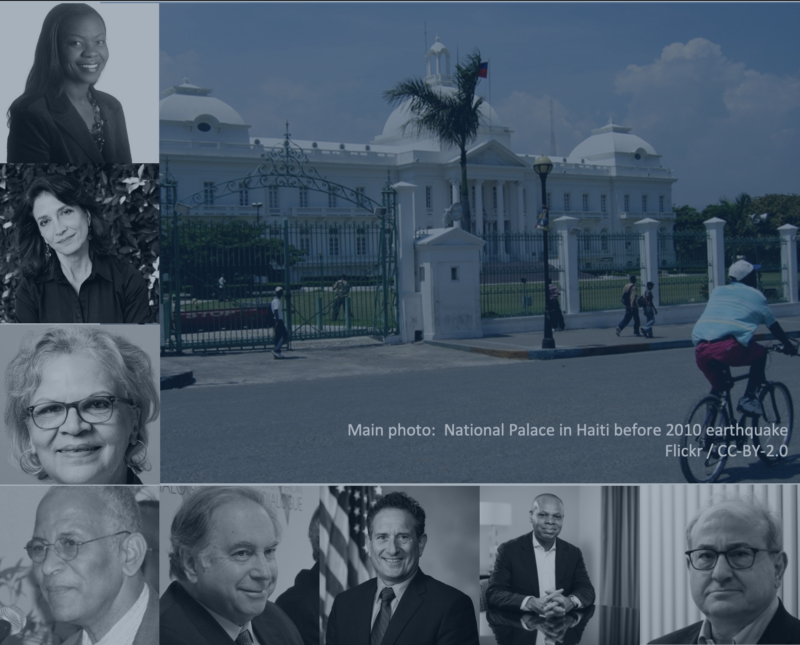Haiti’s Crisis Deepens — What Must Be Done Now?

As Haiti’s crisis deepens, the Inter-American Dialogue together with Quisqueya University, hosted on September 29 the event “Haiti’s Crisis Deepens: What Must Be Done Now?” to discuss how to effectively address the ongoing crisis in this Caribbean nation. The event featured keynote remarks by Congressman Andrew Levin, US representative for New York’s 9th Congressional District and member of the Foreign Affairs Committee; introductory remarks by Michael Shifter, president of the Dialogue; Jacky Lumarque, rector of Quisqueya University; and moderator Jacqueline Charles, Caribbean correspondent at The Miami Herald. Panelists included Michèle Duvivier Pierre Louis, Former Prime Minister of Haiti and Founding President of the Foundation for Knowledge and Liberty (FOKAL); Amy Wilentz, award-winning journalist and correspondent at The Nation and The New Yorker; Juan Gabriel Valdés, First Head of the UN MINUSTAH program, Former Foreign Minister of Chile and Former Chilean Ambassador to the United States; and Patrick Gaspard, President and CEO of Center for American Progress and Former US Ambassador to South Africa. The conversation focused on how the international community can best assist Haiti weather its humanitarian crises and what must be done to restore a functioning and democratic government.
In his welcoming remarks, Jacky Lumarque explained that resolving Haiti’s crises will not be an easy task, but with the support of the international community and true dialogue and negotiation among Haitians themselves, political accountability, efficiency, and the rule of law may be established. Lumarque pointed out three steps that must be taken immediately: address the gang threat that disrupts Haiti’s economy and undermines public security; create a more systematic response to victims of the earthquake and hurricane; and finally, understand that the recent US mass deportation will only exacerbate Haiti’s crisis. The international community must provide the necessary resources to help Haiti pursue sustainable short- and long-term solutions.
Congressman Levin expressed his deep passion for Haiti which has been reflected in his life’s work. He emphasized the importance of ending the violent tactics that have been used to intimidate voters and empowering the Haitian community to rebuild their country. He urged the international community to support the Civil Society Commission for a Haitian Solution to the Crisis, which was endorsed by over 600 citizens with the objective of helping Haitians build a stronger democracy and contribute towards their political development.
Michèle Duvivier Pierre-Louis asked “why is it so hard to educate, create decent jobs and fulfill the rule of law in such a small country like Haiti?” She explained that their ongoing issue with migration is a consequence of bad government, inequality, prejudice, and climate change. Therefore, she agreed with Lumarque that to help Haitians address these problems, their regional friends must come up with solutions to solve the social gap that has marginalized millions of Haitians. She concluded that “fortunately, catastrophes offer opportunities,” and that Haiti’s crisis should not discourage us.
Amy Wilentz observed that over the years, Haiti has had an increase in theft, embezzlement, kidnapping, blackmail, and the illegal enrichment of too many people. Despite a broken government and lack of institutional structure, she agreed with Pierre-Louis that this is a moment of opportunity. Wilentz offered four suggestions to the Biden administration: install new personnel in the US embassy; deal with what’s happening in Del Rio in a humanitarian fashion; abandon failed US policies and the accord hastily cobbled together by the embassy; and support the Civil Society Commission for a Haitian Solution as the only viable, cooperative, and available option now to the crisis. She concluded by paraphrasing a Haitian saying, “the burden is heavy, but with many hands, it can be carried and the serious work of governing a desperate nation can begin.”
Juan Gabriel Valdés criticized the international community for turning a blind eye to the familiar script of a Haitian president slipping toward autocracy amid gang violence and for supporting Moise as the only alternative to chaos. But Valdes did welcome the recent civil society initiative to organize a national dialogue and encouraged the Biden administration and other international actors to empower it as the only way forward.
Patrick Gaspard shared Valdes’ view that the civil society initiative has legitimacy but lacks power. Yet, like the other panelists, he is optimistic that it could succeed under the right conditions. He put forward four specific recommendations for Haitian civil society in cooperation with Haitians in the diaspora along with other international actors and donors: establish fiscal accountability; provide tools for political transparency; implement a new governing disposition and social contract; and lift up a Haiti Development Fund. But most importantly, he stressed that what Haiti needs most is time.
Panelists were stumped on the question of gang violence, which all agreed makes free and fair elections all but impossible and raises the sequencing quandary: how long can Haitians wait for gangs to be controlled before calling elections? When asked if the UN should again send in a military force, Valdes said no, not without a legitimately elected president who could confront the gangs and request such support. Absent that, then a civil society group could stand in. Gaspard added that a clear message to the gangs is also needed from the United States, as the number one exporter of guns in the world.
Pierre-Louise captured the consensus of the panel when she repeated that it’s not just gang violence holding Haiti back. Haiti needs to restore rule of law and build back its collapsed governing institutions. Gaspard added that the broad-based civil society coalition (drawn from labor, political parties, faith-based groups) offers the best path toward creating the architecture for democratic governance.



















